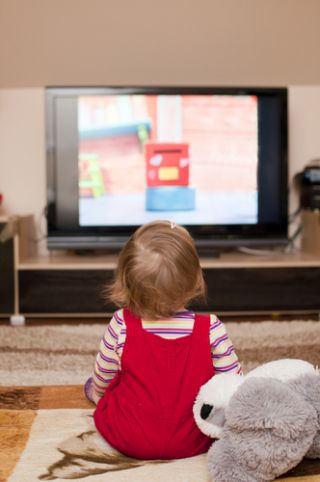Environment
Is Television the Key to Academic Success?
Watching TV may make your children smarter.
Posted June 25, 2013

Earlier today someone asked me if I’d seen news reports that children who watch 3 or more hours of TV a day are smarter than those who do not. I rarely watch TV so had missed the programs mentioned, however my interest was piqued enough to hunt down the research and read it for myself.
It turns out that researchers from the University of London have found a positive association between hours spent watching television and childrens' cognitive test scores.1 While the authors admitted their findings were counterintuitive, they had supporting evidence in a similar study which found TV viewing may improve school readiness in children with less educated mothers. The authors concluded that the educational benefits of TV viewing may be underestimated, although they also acknowledged that the type of television watched is a potentially important variable they had been unable to measure.
Although I rarely watch TV, I cannot say the same of my children. As much as I encourage them to spend time outdoors, I’m the first to admit that I’ve used TV as a babysitter while completing various tasks. That said, I try to align my childrens’ screen time with Australia’s Federal Government guidelines which recommend no television for children less than 2 years of age, and less than 1 hour a day for children aged 2 to 5 years (the American Academy of Pediatrics recommends that children over 2 years limit media time to less than 2 hours a day). While I don’t always succeed in meeting these guidelines, I’m often prompted by reports linking TV viewing to a range of health problems, including attention deficit disorder and hyperactivity, language delays, aggressive behavior and obesity.2,3,4
The TV findings from the University of London were only part of a paper by Dr Alice Sullivan and colleagues which explored the relationship between social class and early cognitive scores in over 11,000 primary school children aged five to seven years. More specifically, the study investigated how this relationship was influenced by parents’ education, income, family social resources and parents’ behaviors. The paper was largely in response to claims by policy makers that parents’ behaviors have a greater influence on children’s academic performance than social class.
The results of the study suggest that policies which dismiss the influence of social class may be misguided, with parents’ education and occupational social class proving the strongest predictors of children’s cognitive test scores. Children of parents’ with graduate or post-graduate qualifications and in salaried employment performed better on their cognitive tests than children of parents’ who had no qualifications or had casual employment. In fact, having parents with graduate qualifications gave children an advantage consistent with being over 1 year older.
These findings do not suggest that parenting behaviors are unimportant. The results found that better cognitive scores were associated with consistent rules and routines regarding bed and meal times, as well as factors relating to the home learning environment, such as daily reading to children, visiting libraries and helping children with their alphabet. Breastfeeding during infancy was also associated with better cognitive scores in early primary school.
Although I’ve previously acknowledged that the home environment is an important determinant of childrens’ academic success, I agree with the authors' point that parenting behaviors in the home environment cannot entirely explain differences in children’s cognitive scores. That said, it is reassuring to see studies that support my own family’s emphasis on reading and maintaining consistent bedtimes. Admittedly, I’m yet to be convinced that my children will benefit from watching more than 3 hours of television a day. Catch me on a bad day however, and I may be willing to convince myself otherwise.
References
- Sullivan A, Ketende S, Joshi H. Social Class and Inequalities in Early Cognitive Scores. Sociology. Published online 29 April 2013.
- American Academy of Pediatrics. Media Education. Pediatrics. 2010; 126(5):1012-1017.
- Wartella EA, Lauricella AR. Should Babies Be Watching Television and DVDs? Pediatric Clinics of North America. 2012; 59(3):613-621.
- Schmidt ME, Haines J, O’Brien A, et al. Systematic Review of Effective Strategies for Reducing Screen Time Amount Young Children. Obesity. 2012; 20(7):1338-1354.


